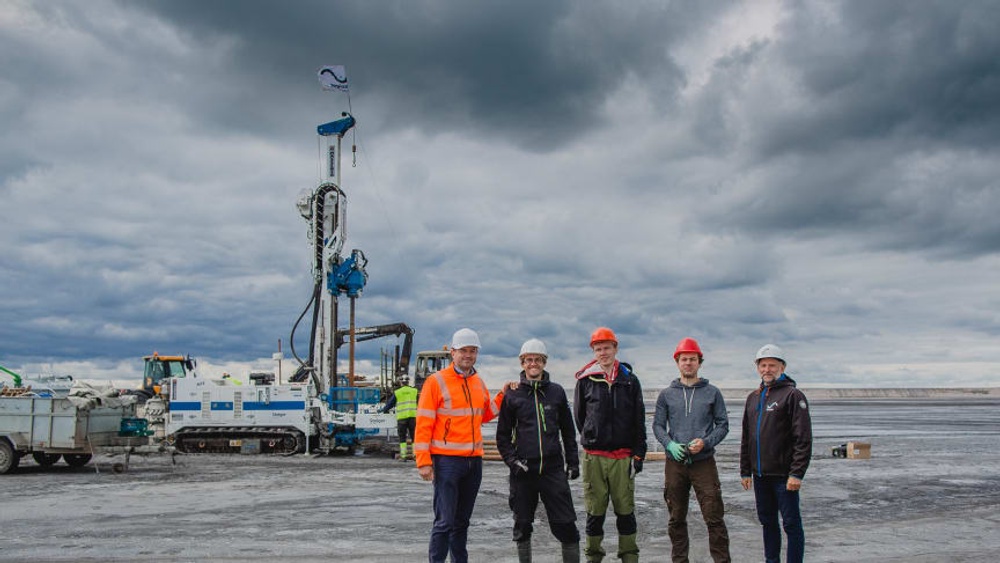The state of Estonia invests 1.7 million Euros in Ragn-Sells’ oil shale ash project
 From left: Ragn Sells Project Manager Alar Saluste, Research Fellow in Geology Martin Liira, Junior Research Fellow of Geology Kristjan Leben, Researcher Riho Mõtlep and Drilling Department Manager at Steiger Meelis Peetris.
From left: Ragn Sells Project Manager Alar Saluste, Research Fellow in Geology Martin Liira, Junior Research Fellow of Geology Kristjan Leben, Researcher Riho Mõtlep and Drilling Department Manager at Steiger Meelis Peetris. The environmental company Ragn-Sells’ Oil Shale Ash Project has been granted 1.7 million Euros from Enterprise Estonia’s Applied Research Programme. The project uses the ashes from oil shale incineration in Estonia to produce the world’s first climate-positive calcium carbonate for use in paper, cardboard, plastic, and building materials.
– If we are serious about creating a sustainable society, we have to start using the materials we already have as often as possible. Thanks to the support from Enterprise Estonia, we can produce enough recycled calcium carbonate from discarded oil shale ash and captured carbon dioxide for our partners to use in their pilot products, says Alar Saluste, project manager at Ragn-Sells.
The funding will enable Ragn-Sells, in cooperation with researchers at Tallinn Technical University and the University of Tartu, to carry out the next steps in the industrial tests required for the production of calcium carbonate out of oil shale ash. In addition, the investment from Enterprise Estonia also enables continued research on other raw materials that could be extracted and recycled from oil shale ash.
In the process, the ash is combined with captured carbon dioxide to produce calcium carbonate, a commercial product used in many applications such as paper, cardboard, plastic, and building materials. Today, carbonate is produced by mining and burning limestone, which causes large emissions that harm the climate.
– Today’s use of natural resources is not sustainable. With the Oil Shale Ash technology, we can bring valuable resources back into the loop. By using existing oil shale ash instead of burning limestone, commercial production of climate-positive calcium carbonate out of oil shale ash can be a reality within the next three to four years, says Alar Saluste.
The goal of the Oil Shale Ash project is to reuse ash generated in the production of electricity from oil shale in Estonia. Initially, the plan is to produce high-quality calcium carbonate by using 1.3 million tonnes of deposited oil shale ash each year. The calcium from the ash will capture and bind about 600,000 tonnes of carbon dioxide, making the product climate-positive.
– The calcium carbonate produced from oil shale ash is a great example of circular economy, reducing the environmental burden in Estonia as well as the need to mine virgin materials. At the same time, this unique technology will capture CO2 during the production, making it the world’s only climate-positive calcium carbonate, says Alar Saluste.
For more information, please contact:
Alar Saluste, Project Manager, alar.saluste@ragnsells.com, +372 5349 4861
Emma Ranerfors, Press Officer, press@ragnsells.com, +46 10 723 24 16
Read Ragn-Sells Estonia’s press release (in Estonian)
Fact box: The Oil Shale Ash Project
- The ash from incineration of oil shale in Estonia, rich in calcium, is combined with captured carbon dioxide to produce a compound called PCC.
- Today, PCC is produced by taking limestone from quarries and heating it to over 1,000 degrees Celsius in a process called calcination. Not only is this process very energy-intensive; the very purpose is to purge carbon dioxide from the limestone, and it is generally released into the atmosphere.
- By using the oil shale ash instead of burning limestone, a significant source of emissions is cut out from the production of PCC.
- When captured carbon dioxide is combined with the ash, the carbon is bound in the resulting material. Additionally, the emission-intensive mining of natural limestone is replaced by existing materials, which further reduces the carbon footprint of circular PCC.
- Every kilo produced carries a negative carbon footprint of 0.4 kg CO2e, meaning that production effectively removes carbon from the atmosphere.
- Estonia’s mountains of oil shale ash represent a massive environmental debt, built up over many decades. Bit by bit, circular PCC production will help with the cleanup by putting the ash to use.
- Decades of dependence on oil shale have left Estonia with 600 million metric tonnes of ash. The mountains created by this ash cover an area larger than the Maldives.
- PCC is a calcium carbonate, just like the one obtained from mining limestone and burning it in a kiln. It is used in a wide variety of products such as paper and cardboard, plastic, and building materials.
The Oil Shale Ash Project is a collaboration between Swedish environmental company Ragn-Sells, Tallinn Technical University (TalTech), University of Tartu and the state-owned energy company Eesti Energia (known internationally as Enefit).
About Ragn-Sells Group
Ragn-Sells is a family owned corporate group, with operations in four countries. We started our journey in 1881, and since 1966 we have been involved in waste management, environmental services, and recycling. We collect, treat, detoxify, and recycle waste and residual products from businesses, organisations, and households so that they can become feedstock into new production processes. www.ragnsells.com